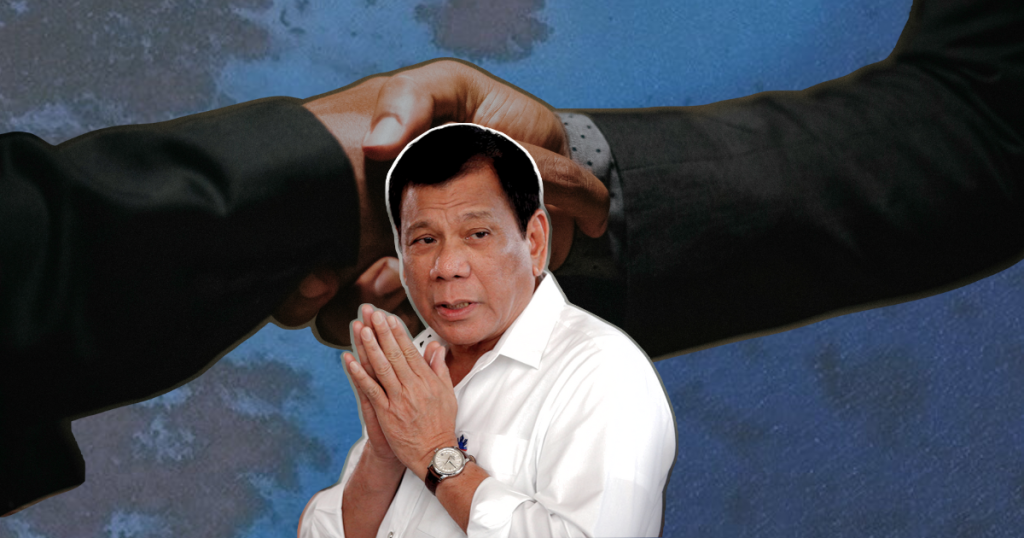Duterte’s Gentleman’s Agreement

By Manuel Mogato | Date 05-31-2024
MANILA — Salvador Medialdea, the former executive secretary in the Duterte administration, firmly denied the “gentleman’s agreement” between the former president and China’s leader Xi Jinping.
The two met more than six times when Rodrigo Duterte was in power from 2016 to 2022. They again met once after Duterte left Malacanang.
Medialdea did not only deny the verbal deal under Duterte, but he also pointed to another deal struck during the Benigno Aquino III administration.
He pointed to former defense secretary Voltaire Gazmin, who agreed with the Chinese embassy to bring only food and fresh water to troops stationed at BRP Sierra Madre, sometime in 2013.
Medialdea said he learned about the deal 12 days after Duterte was sworn into office in July 2016, only days before the Permanent Court of Arbitration in The Hague made a ruling that repudiated China’s nine-dash-line and awarded the Philippines economic rights in the West Philippine Sea under the 1982 United Nations Convention on the Law of the Sea (UNCLOS).
Medialdea said the Duterte government respected the deal made by Gazmin and kept the status.
But, there were flaws in Medialdea’s testimony before the House Committee on National Defense and Security.
First, Medialdea needed to produce a copy of the agreement entered into by Gazmin with the Chinese embassy.
Second, his testimony is primarily hearsay from someone he could no longer remember. It is a convenient excuse.
Third, former defense secretary Delfin Lorenzana denied any knowledge about Gazmin’s deal. Gazmin did not inform him about the supposed deal if there was any.
Fourth, he passed the buck to a previous administration to clear Duterte of any wrongdoing.
Medialdea also needed to remember fundamental details about the relations between the Philippines and China.
The Philippines had filed an arbitration case against China in early 2013, a move that angered Beijing as contacts between the two states were reduced.
If there was an agreement on the bringing of supplies to BRP Sierra Madre, how could China have prevented the wooden supply boat from carrying out its mission during that time?
The international and local media were reporting China’s shadowing and blocking of a civilian supply vessel from reaching Ayungin Shoal.
During that time, in 2013, there were already rumors swirling in the local media about the repairs made inside BRP Sierra Madre to prevent it from disintegrating, almost 15 years after it ran aground on the submerged shoal.
Reuters, in an exclusive report in July 2015, finally reported about the repairs based on interviews with two officers, including a general.
Ambassador Charles Jose, a foreign affairs undersecretary who was a spokesman at that time, declined to comment about the repairs but emphasized if the military decided to do it, it was not illegal under the 2002 Declaration of Conduct of Parties in the South China Sea, an informal code of conduct signed by China and the 10-member Association of Southeast Asian Nation (ASEAN) in Phnom Penh.
China tried adhering to the code by not occupying any new feature in the South China Sea. It also built artificial islands only on the features it already occupied.
The 2002 DOC stands, although there were still blatant violations by China, like excessive reclamations and converting the reefs and shoals into military fortresses with ports and airfields.
The reclamation and construction also began in early 2013, activities which the Philippines and other Southeast Asian states protested.
In 2013, relations between Manila and Beijing were getting sour and shaky. Do you think an agreement on Ayungin Shoal is feasible during that time?
The tense situation in the West Philippine Sea began in 2011 when Chinese warships stopped a private exploration vessel hired by an Anglo-Filipino company to test oil and gas fields in the Reed Bank.
The following year, there was a standoff in Bajo de Masinloc when BRP Gregorio del Pilar tried to arrest Chinese fishermen who were rescued by China’s Coast Guard.
This would show that relations between China and the Philippines slowly deteriorated even before a supposed deal on the Ayungin Shoal was forged.
In any case, Medialdea was lying and trying to deflect the blame on Duterte.
Despite outright denials by three former Duterte officials — Medialdea, Lorenzana, and former National Security Adviser Hermogenes Esperon — the gentleman’s agreement was confirmed by Duterte’s former spokesman, lawyer Harry Roque.
It is unclear what was Roque’s motive for revealing a secret deal between the former president and the Chinese leader.
Why was Roque mouthing Chinese propaganda? Beijing’s foreign ministry and its embassy in Manila have been insisting on the existence of a gentleman’s agreement.
It was not pointing to the administration of former president Aquino. However, China has also been insisting on separate new deals with the Marcos administration — the one struck by Ambassador Teodoro Locsin Jr in September 2023 and with another DFA official early this year.
These two agreements under Marcos would be better discussed in another column.
The absence of a written document about the gentleman’s agreement between Xi and Duterte would be difficult to prove.
However, it should be enough that Duterte himself had admitted that he had a verbal agreement with Xi.
Tags: Politics
